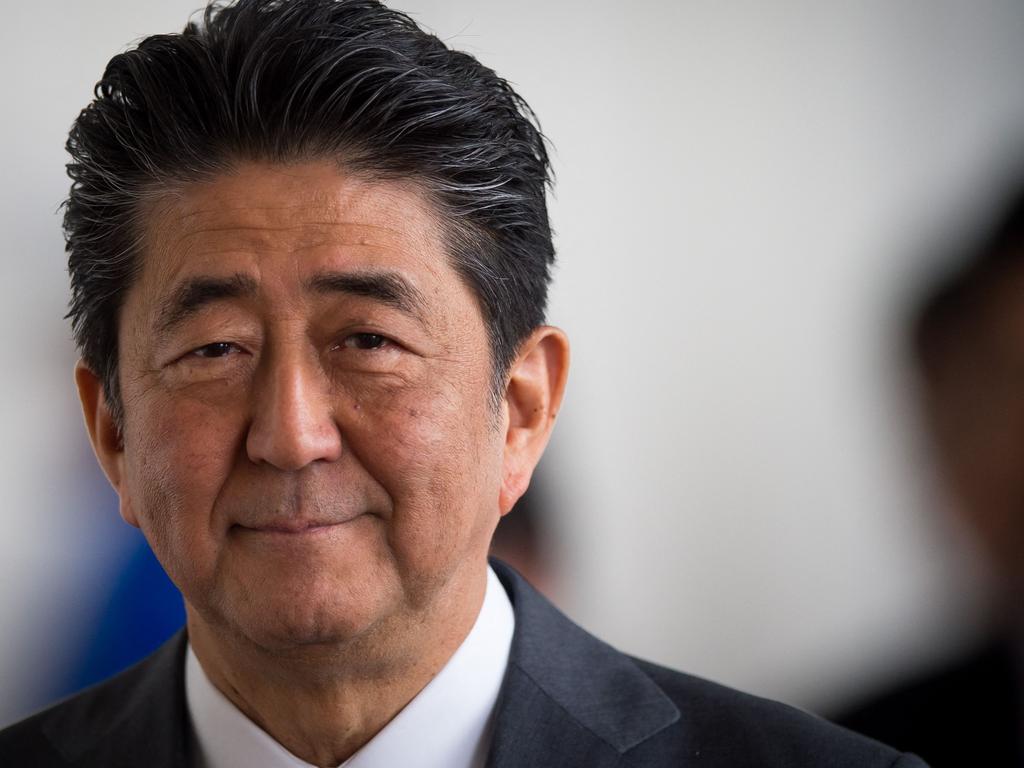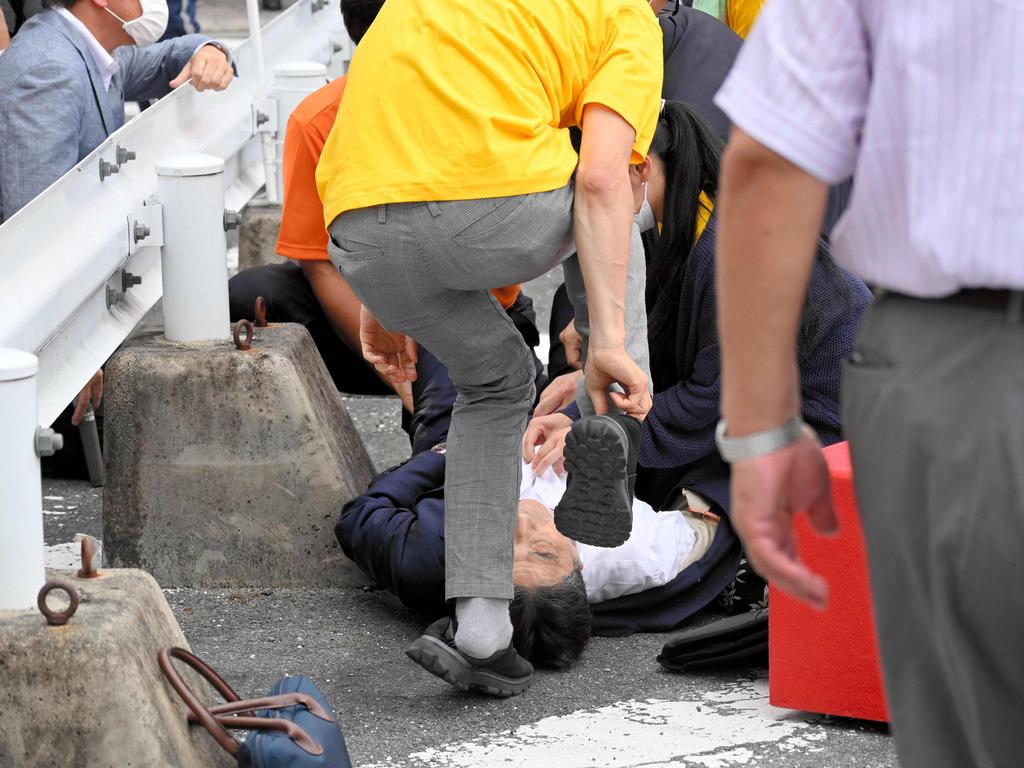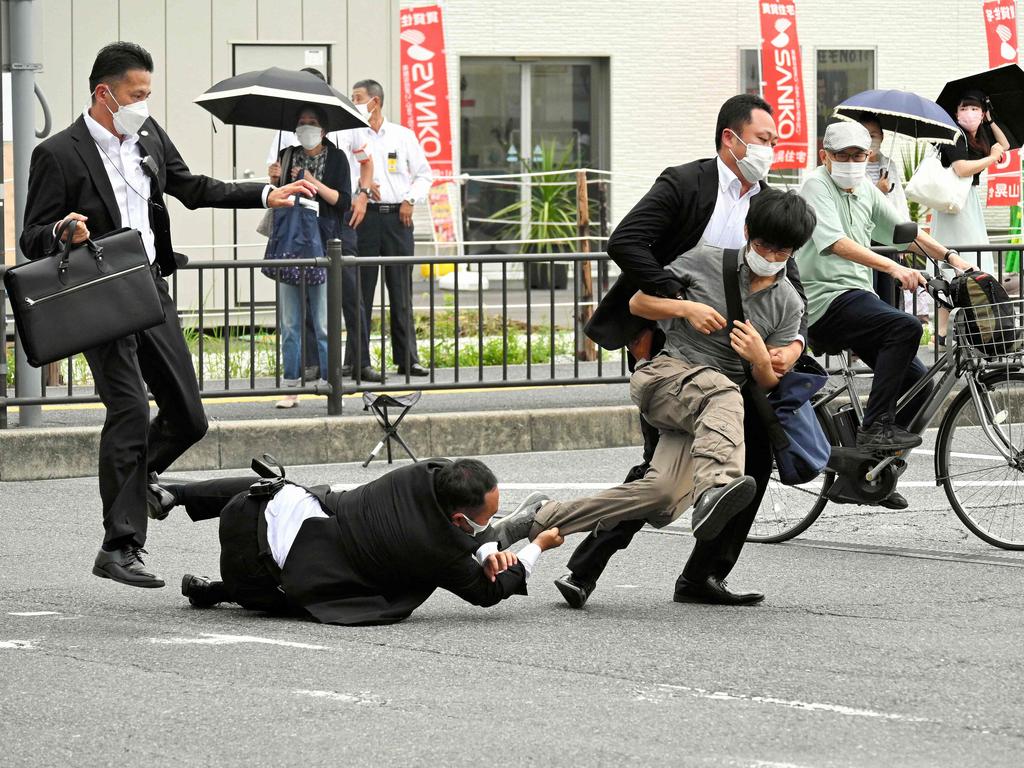‘Pop Champagne’: Shinzo Abe’s death celebrated in China and South Korea
Shinzo Abe’s assassination has triggered an outpouring of grief from around the globe. But some callous people are celebrating his death.
Chinese nationalists on social media are celebrating the tragic death of Japan’s former Prime Minister Shinzo Abe, who was assassinated while speaking to a crowd at a campaign event, with some hailing his killer a “hero”.
Abe, 67, was shot twice at close range while giving a campaign speech in support of a candidate in the ruling Liberal Democratic Party, in the city of Nara around 11.30am local time.
Abe was rushed to hospital but couldn’t be revived and was declared dead at 5.03pm, bleeding to death from two wounds on the right side of his neck, a doctor told a press conference.
The suspected gunman has been identified as 41-year-old Nara resident, Tetsuya Yamagami, who was arrested on the spot.
In a press briefing, Nara Nishi police said Yamagami had confessed to shooting the former prime minister with a homemade weapon.
World leaders from the past and present – including prime ministers, presidents and Queen Elizabeth II – have expressed shock and sadness over the assassination of Abe.
But his death has elicited very different responses among the public in China and South Korea, underscoring Abe’s controversial legacy and lingering historical disputes between the neighbours. Chinese nationalists rejoiced on social media, calling to “let the celebrations begin” and “open Champagne”. In South Korea, few people offered their sympathy for Abe, according to Vice.

‘Great news’: Chinese commentators react
Abe spent nearly eight years at the helm of the Japanese government before resigning in 2020 over health concerns.
He introduced major reforms, including modernising Japan’s security forces, stepping up alliance with the US, and reviving the economy after two decades of stagnation. He was also known for pushing back against increasing aggression from China in the Indo-Pacific region, partly by initiating the Quad — a security partnership with the US, Australia, and India, which was considered by China to be the “Asian NATO”.
12. From Twitter
— å·´ä¸¢è‰ Badiucao (@badiucao) July 8, 2022
Champagne for Abe‘s death from Chinese user pic.twitter.com/7oP67ZEM7R
A social media account of China Central Television was filled with comments in support of the attack that killed Abe.
One Weibo post said it would be fitting if Abe atoned with his life for Japan’s invasion of China before World War II just a day after the 85th anniversary of the start of hostilities in 1937, Bloomberg reports. That post got 210,000 likes. After Abe died, a post saying, “Let the celebrations begin!” got more than 150,000 likes within 30 minutes, according to the outlet.
On Billibilli, China’s equivalent of YouTube, someone users wrote: “Great news” on a video about Abe’s killing.
Chinese artist and activist Badiucao tweeted on Friday that some Chinese nationalists were celebrating Abe’s death. “Chinese nationalists on Weibo have began to celebrate that Japan’s ex PM Abe is shot during campaign today. they call the attacker ‘hero’ and send death wish to Abe,” Badiucao tweeted.

The artist cited a post from WeChat, the popular social media platform in China, that said: “I hope it is the current Japanese PM got shot … and Korean one too”. According to the activist’s posts, others on the platform were joking about eating an extra bowl of rice to celebrate Abe’s death. He also posted a screenshot of a Twitter reply saying: “Abe is dead, it’s like, open champagne”.
Another tweeted: “I hate my country’s government, but that doesn’t stop me from loving my country or celebrating Abe’s death. Good to die. Pop champagne! Well done.”
The artist cited other posts from Weibo saying: “I am waiting for Abe’s death” … who is the attacker? I want to donate money” and “I have to say, it's a great news”. The artist posted a photo of a WeChat conversation with a picture of the suspected shooter being apprehended.
“thank you anti-Japan hero (the attacker),” one message read.
“Can I laugh?” another wrote.
Other comments read: “Party Time” and “f*** I am so happy.”
Abe angered the Chinese government and especially the more nationalist segment of the ruling party — both while he was in office and after he stepped down — in particular for pushing Japan to increase military spending and revise the pacifist article in its constitution.
In 2013, his visit to the Yasukuni Shrine in Tokyo drew a quick rebuke from China for paying respects at a site that memorialises war-dead including World War II criminals.
Photo of the suspect that shot Japanese former PM Shinzo Abe. The weapon looks like a custom sawed-off shotgun. pic.twitter.com/eVDcZPZ5xW
— Global: MilitaryInfo (@Global_Mil_Info) July 8, 2022
Haunting footage captures Abe’s final moments
Japan’s longest-serving prime minister was delivering a campaign speech for Kei Sato, a fellow Liberal Democratic Party member and a national election candidate, when he was gunned down in front of horrified onlookers.
A haunting photo captured at the event showed Yamagami standing behind Abe as he took up the microphone. Video and images from the scene taken moments later showed the former prime minister collapsing to the ground, with blood on his shirt after two loud blasts rang out.
Abe was transported to Nara Medical University Hospital in cardiopulmonary arrest but had no vital signs upon arrival and was unable to be revived, according to Hidetada Fukushima, the doctor who treated Abe.
During a news conference at Nara Medical University Hospital, doctors said Abe had sustained two bullet wounds to his neck, about 5cm apart, and also suffered damage to his heart.
He was pronounced dead just over five hours after he was shot.

Yamagami allegedly later told police that he believed Abe was linked to a “specific organisation” which the unemployed suspect reportedly had a grudge against. The police would not reveal the name of the organisation.
While details of the suspect’s motives remain limited, local media outlets reported that Yamagami told police he was “dissatisfied with former Prime Minister Abe and aimed to kill him”.
In reporting Abe’s death, China’s state-run Global Times noted “he had falsely claimed that ‘a Taiwan emergency is a Japanese emergency’” in December last year, when he had already left the post of prime minister.
The publication described that as “a serious violation and provocation against the one-China principle, not to mention his frequent visits and tributes to the Yasukuni Shrine”.
“Those wrong words and deeds after Abe stepped down almost completely overturned the achievements he once made in underpinning China-Japan ties,” the article continued.
Lü Chao, director of the Institute of the US and East Asian Studies at Liaoning University, described Abe as an “actor”, in an interview with the outlet.
Hard to overstate how unusual this shooting in Japan was. Yes, a PM was assassinated in 1932 and a party leader in 1960, but in a typical year fewer than 10 Japanese are murdered with guns.
— Nicholas Kristof (@NickKristof) July 8, 2022
In my five years in Japan, I covered murders, but never a shooting that I recall.
#CCP's Little pinks celebrating #AbeShot on the internet. Read red color translation by me.
— Jennifer Zeng 曾錚 (@jenniferatntd) July 8, 2022
The plot was set long ago. Watch this if you missed my warning!
Unifying #Taiwan Begins with the #Senkakus, under the Banner of Fighting #Japanese Neo-Militarismhttps://t.co/uswnjL0GKepic.twitter.com/7rnlEtDfWb
“Abe, when in office, had to consider ties with China, particularly the economic facet, because that will bring benefits to Japan,” the article continued.
“No matter what purpose he had, the contributions he made to China-Japan ties were remembered.”
But Lü claimed that Abe “did not recognise Japan’s war crimes”, the article said.
“That’s why Abe spoke his mind after stepping down and acted unscrupulously over the Taiwan question.”
The Foreign Ministry took a more sympathetic approach in line with the rest of the world on Friday. China was “shocked” by the attack, spokesperson Zhao Lijian said at a Beijing press briefing just before news that Abe had died, saying the nation hoped he would recover soon.
“This unexpected incident should not be linked with China-Japan relations,” Zhao added. When asked about some nationalist voices in China celebrating the shooting, Zhao declined to “comment on the remarks of net users”, Bloomberg reported.
The Chinese embassy in Tokyo offered its condolences to Abe’s family, saying in a statement he made contributions to the development of relations during his tenure as prime minister.
Japanese Prime Minister Fumio Kishida paid tribute to his predecessor in a news conference after Abe was declared dead, calling him “very warm and kind.”
“It is truly regrettable. I am lost for words. I offer my sincere condolences and prayers that his soul may rest in peace,” Kishida said.




